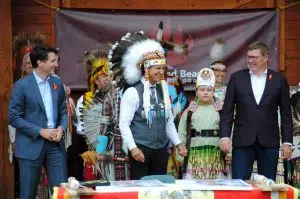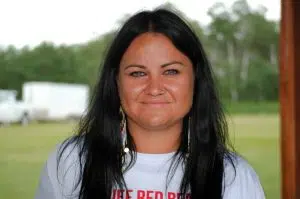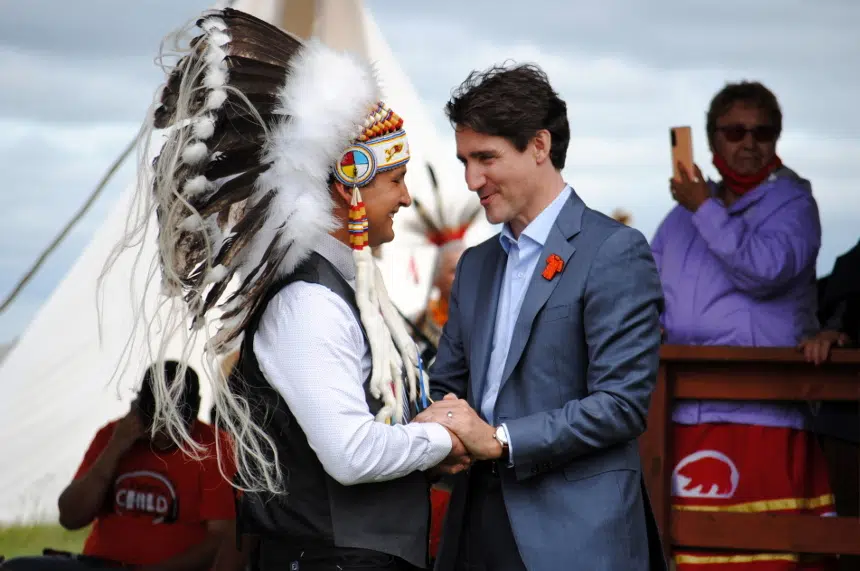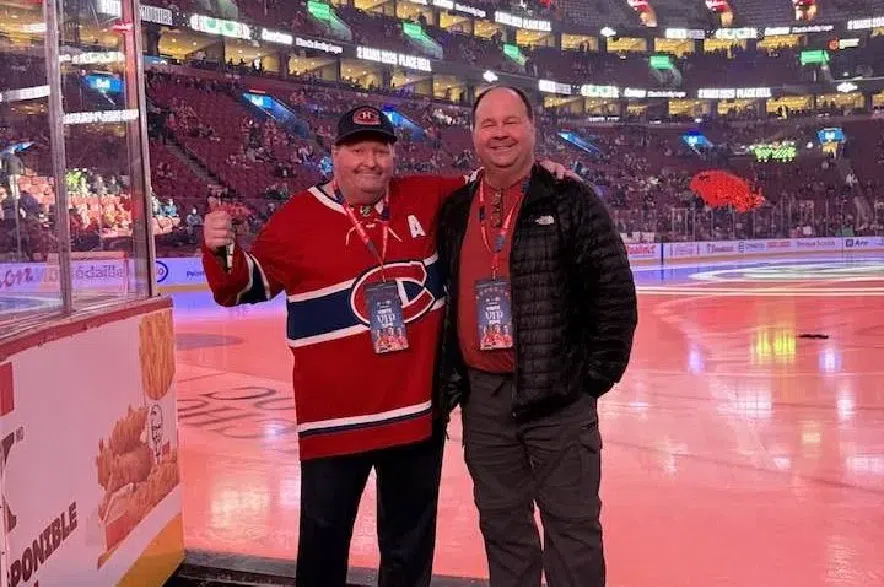Clouds may have crowded in for the afternoon, but the feeling at the Cowessess First Nation on Tuesday was one of celebration and achievement.
With Cowessess Chief Cadmus Delorme, Premier Scott Moe along with a rare appearance in Saskatchewan for Prime Minister Justin Trudeau, a coordination was signed by all three to finalize the Cowessess taking back jurisdiction over child and family services for its citizens, no matter where they are in Canada.
“The end goal is, one day, there will be no children in care. I’m 39 years old, I hope that happens in my lifetime,” said Delorme.
The signing makes Cowessess the first First Nation in the country to take this jurisdiction back by taking advantage of bill C92.
The Miyo Pimatisowin Act was ratified in March of 2020 by Cowessess citizens “asserting our Inherent Rights for our children and families in need of help.”
Standing in front of a banner for the program called the Chief Red Bear Children’s Lodge, Delorme said there’s a lot of work yet to do.
“Every day we will roll up our sleeves to make sure that every child, when we call them home, that they know where home is – and that is Cowessess First Nation – and they will dance, they will get their education and they will walk with their chin up and be a proud Cowessess citizen,” said Delorme.

Prime Minister Justin Trudeau (L), Chief Cadmus Delorme (C), and Premier Scott Moe (R) signed a coordination agreement Tuesday to put jurisdiction for child and family services back with the first nation. Jul. 6, 2021 (Mattea Columpsi/980 CJME)
Trudeau spoke to the crowd about reconciliation, saying that the whole country has been reminded in the past few weeks that the path of reconciliation means recognizing past wrongs and working to do better.
“It is not just about Indigenous peoples and governments who wronged them – although that’s certainly a part of it,” said Trudeau.
“It’s also about non-Indigenous Canadians understanding that not only what generations of Canadians were taught was wrong, but it was harmful. And it led to the creation of policies and institutions and ways of doing things in this country that didn’t respect, acknowledge, or value the extraordinary strength and worth and contributions of Indigenous people.”
The prime minister explained that steps, like the agreement with Cowessess, happened because of leaders like Delorme who stepped up to work and help create legislation. He said this agreement recognizes that removing children from their culture, language and land is not the right path forward.
“Kids need to be kept by, and protected by, supported by and taught by their communities,” said Trudeau.
Trudeau announced the federal government would be putting $38.7 million toward the Cowessess program.
Premier Scott Moe said he was proud to be part of this “groundbreaking” agreement, and explaining that it was the culmination of many months of negotiations driven by Delorme – that the chief was determined to see this happen and for Cowessess to assert its independence.
It was less than two weeks ago that Cowessess announced the finding of up to 751 unmarked graves on the grounds of a former residential school, and that still fresh knowledge hung over and was a part of the proceedings at times.
Moe agreed with Delorme in saying that residential schools weren’t the fault of anyone at the event, but that everyone has to deal with the consequences of decisions made generations ago.
“We have a duty, we have an obligation to build a brighter future for all of us. We can do that, we can do that together – it’s what brings us here this afternoon. The desire to build a brighter future for this community, maybe not even for us but for that next generation, for our children and for our grandchildren,” said Moe.
Delorme said the past two weeks have been tough for the first nation.
“This coordination agreement is hope. This coordination agreement focuses on our children. This coordination agreement focuses on those kids right now that are in care that they think they’re from Cowessess but they don’t know what that means,” said Delorme.
“Pain is going to continue today and tomorrow, but it’s moments like this are going to make sure that our motivation come from our hope and our dreaming.”
Delorme said Cowessess won’t stop at gaining jurisdiction over its children. He said they’re now talking about land and membership and trying to exit out of the relevant clauses of the Indian Act.
Nicole Cook
Among the people singled out at the ceremony were three who came home to the first nation as adults – Delorme apologized for not bringing them back sooner and said “you’re home now”.
One of those people is Nicole Cook. She said her parents were affected by intergenerational trauma and that got passed down to her and her siblings.
 “I’m thankful for my parents, I love my parents, they did the best that they could, the best that they knew how. But at a young age we were abandoned in a house with no parental guidance, nobody around, no food,” said Cook, calling her and her siblings little survivors.
“I’m thankful for my parents, I love my parents, they did the best that they could, the best that they knew how. But at a young age we were abandoned in a house with no parental guidance, nobody around, no food,” said Cook, calling her and her siblings little survivors.
She didn’t end up in the child welfare system and thinks if she had been then things would have been a lot worse for her.
Cook started nursing school and had two sons but soon began to feel like something was missing in her life.
“It got to the point where owls would fly, stare at me, fly over me. Change needed to happen and so I started really digging into who I was and where I was from and that’s when I met Chief Cadmus. And Chief said ‘you need to come home Nicole, you need to help me with a project, you need to help me take care of the kids.”
Cook is now the CEO for the Chief Red Bear Children’s Lodge. She said she’s been welcomed back into the community.
“I actually walked the land for the first time during the moose hide walk and the drums were going and I just felt this sense of peace and knew that my Kookum walked these exact lands and I was very honoured to be here and very proud to be part of this reserve.”
As for the program, Cook said social services supports the foster family to take the children, instead of supporting the family to keep their children – and that’s where Cowessess is going to be different.
“This is the opportunity for us to take back our children and our families and nurture them, bring them back to culture, show them who they are,” said Cook.
The Act
Last July, Delorme said the act was a way to ensure children are able to stay on track with their development “to ensure the next generation is going to be well-prepared for whatever the world brings us.”
“When you control your destiny, you have to focus on what matters most,” Delorme said at the time. “Cowessess, we are a very forward-thinking First Nation and we want to own (our child welfare system) and figure it out today.
“We own our history and we cannot sentence another generation or wait for the next generation to fix our issues.”
Delorme said the First Nation’s internal legislation addresses apprehension of children and prevention of families requiring such intervention by the child welfare system.
It also seeks to address inequality and socioeconomic conditions and implements Jordan’s Principle, which ensures all First Nations children in Canada have access to the products, services and supports they require. These include health, social and educational needs.
If children are not meeting the development stages they should be, Delorme said the band will step in to help.







